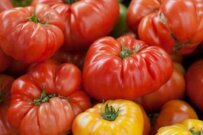I wavered on classifying this as a superfood or a folk remedy post. Ultimately, I decided on folk remedy because, according to the University of Maryland, most studies on the health benefits of turmeric have been completed in test tubes or on animals and may have a slightly different effect on humans.
Turmeric comes from the root of the Curcuma longa plant and has a tough brown skin and a deep orange flesh. Turmeric has a peppery, warm and bitter flavor and a mild fragrance reminiscent of orange and ginger. It is best known as one of the ingredients used to make curry, however it is also used in mustard and to color butter and cheese.
Curcumin, an component of turmeric, lowers the levels of two enzymes in the body that cause inflammation, stops platelets from clumping together to form blood clots, and is a powerful antioxidant. Antioxidants scavenge the body for molecules known as free radicals (which damage cells, tamper with DNA, and can cause cell death) and can fight them, possibly reducing or preventing some of the damage they cause.
Turmeric has been used in ancient Ayurvedic and Chinese medicine as an anti-inflammatory, to treat digestive and liver problems, skin diseases, and wounds. Laboratory studies show that turmeric may help fight infections and some cancers as well. Human studies, which are limited, have proven turmeric to be effective in the treatment of indigestion and inflammation caused by arthritis. According to the American Cancer Society, supporters claim that turmeric stimulates the gallbladder and circulatory systems, reduces cholesterol levels, dissolves blood clots, helps stop external and internal bleeding, and relieves painful menstruation and angina (chest pains that often occur with heart disease). Digestive problems thought to be improved by turmeric include irritable bowel syndrome, colitis, Crohn’s disease, and illnesses caused by toxins from parasites and bacteria.
Turmeric is available in powdered form as a spice in many grocery stores and can be made into a tea or purchased as a tincture, capsule, or tablet, and is sometimes sold in combination formulas with other herbs. Ointments or pastes can be made from turmeric and applied to the skin.
In general, turmeric in food is considered safe, however consult your physician before beginning a supplement treatment as turmeric may have contraindications for some medications.
Source:
http://umm.edu/health/medical/altmed/herb/turmeric
http://www.nlm.nih.gov/medlineplus/druginfo/natural/662.html





